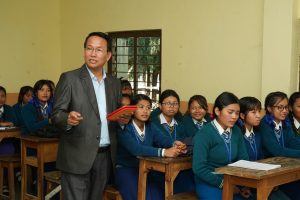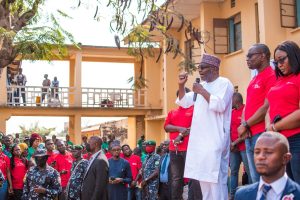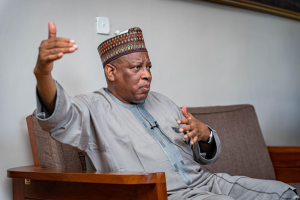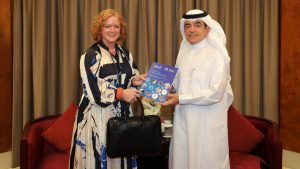Funding is Not the Starting Line: What Africa’s Education Systems Can Teach the World About Delivering Learning
Why prioritizing data, structured teaching, and digital infrastructure is key to solving the global learning crisis
At the Education World Forum (EWF) in London last week, more than 100 ministers and national education leaders gathered to grapple with aquestion facing every government: how do we deliver real learning for every child?
This year’s forum was marked by a growing urgency. While progress has been made on school access, foundational learning remains in crisis. In sub-Saharan Africa, nine out of ten 10-year-olds still cannot read a simple sentence with comprehension. Globally, the problem persists even in high-income countries, with one in three children in the United States falling below basic reading levels.
Against this backdrop, Shannon May, President and Co-Founder of NewGlobe, offered a direct challenge during her plenary address: “Funding is not where to start; it is where to end.”

Planning for Learning Starts With Priorities
May argued that before governments ask how much to spend, they must ask what they are solving for. Learning poverty is well known, but too often, the policy response lacks a clear plan for tackling it.
The current debate around Sustainable Development Goal 4.1.1 illustrates this point. The UN recently reduced its reporting focus on learning outcomes, as only 37 countries have submitted sufficient data in the past six years. Many are considering dropping learning assessments in favour of enrolment metrics alone. But May was unequivocal: “If we only measure enrolment, we will not have focus on learning.”
Digital Public Infrastructure for Learning
Drawing on successful programs across Nigeria, India, and Rwanda, May pointed to the role of real-time data systems in driving effective education delivery. In Lagos State’s EKOEXCEL program, each public school is connected through handheld teacher tablets that track daily lessons, attendance, and assessments. These devices are not just digital textbooks; they are embedded in a larger system of support and oversight.
Dashboards in state-level Situation Rooms allow policymakers to see what’s happening in every school. Where issues arise—such as teachers arriving late or struggling with content—education officers can intervene immediately, rather than waiting for end-of-year reviews. In Kwara State, even the Governor has personally followed up on absenteeism thanks to real-time data.
These tools form the foundation of what May called digital transparency, a new form of accountability that connects Ministers directly to what’s happening in classrooms and empowers teachers with feedback, coaching, and tailored support.

AI and the Future of Teaching
While many global discussions around AI focus on students, May emphasized its transformative potential for teachers. AI coaching tools, deployed through basic smartphones or tablets, can now analyze classroom interactions, pace, tone, and lesson completion. This feedback helps teachers improve every day, even in remote or low-resource environments.
“Teachers are governments’ largest investment in education,” May noted. “By using AI to support them—personally, frequently, and at scale—we maximize that investment.”
African Leadership on Learning
From KwaraLEARN in central Nigeria to RwandaEQUIP in East Africa, governments are demonstrating that transformation is possible when systems are built to prioritize and measure learning. These programs deliver structured pedagogy, daily performance tracking, and targeted interventions aligned with children’s current learning levels.
Independent evaluations have confirmed the impact. In Edo State, test scores rose more than 12 percent in literacy and numeracy over two years. In Kenya, Nobel Laureate Michael Kremer’s study found NewGlobe-supported schools delivered learning gains among the largest ever recorded in international education.

From Measurement to Momentum
Africa’s emerging education story is one of systems built for scale and outcomes. The lesson is clear: learning requires more than commitment—it requires implementation fidelity, clear data, and support for teachers.
As Shannon May closed her remarks, she left education leaders with this: “If your priority is learning, then prioritizing digital infrastructure that connects every school to you, enabling system-wide visibility and evidence-based decisions, is the most important investment you can make.”
The tools exist. The evidence is mounting. The question now is whether governments will plan for learning, not just fund education.



